Mealtime Partners, Inc.
Specializing in Assistive Dining and Drinking Equipment
November 2012 Independent Eating and Drinking Newsletter
 |
November Topics:
|
||
|
Mealtime Partners Home Page Send a Comment or Suggestion |
|||
| Subscribe to Newsletters |
The Importance of Mealtime Independence
Over the past decade Mealtime Partners has worked diligently to develop products that facilitate independent eating and drinking for those individuals who are unable to feed themselves or drink independently. The company is unique in the world, as it is the only organization that is solely dedicated to the production and sale of assistive technology to provide independent eating and drinking to those who lack the hand and arm function to be self-sufficient in these areas. This effort has been made because we passionately believe in each individual’s right to be independent if they choose to be. Eating and drinking are neglected areas except for a few adaptations to dishes and utensils that are commercially available and can be used by some people. However, for those with little or no hand or arm functionality, these types of modifications to standard dining equipment have no value and thus they are forced to be dependent upon someone else for all of their nutrition and hydration needs. That’s where Mealtime Partners specializes.
Independent eating and drinking is an evolution in most people’s lives. We begin life completely dependent upon others for all of our nutrition and hydration needs and gradually become more and more independent. By the time a child is just a few years old they are able to drink out of a normal cup without assistance (with only an occasional spill) and feed themselves using a spoon or fork. Cutting up food will follow shortly afterwards to provide complete independence at mealtimes. At this developmental point in life, eating and drinking skills are taken for granted, and, little or no conscious thought given for the majority of the person’s life.
At the other end of one’s life span, the eating and drinking skills developed in infancy and childhood begin to degrade due to a wide range of causes including dementia, arthritis and stroke. Deterioration of eating and drinking skills can result in under or malnutrition and dehydration (for more information, refer to the article Assessment and management of eating skills in the older adult by Christine Eberhardie on NursingTimes.net. February, 2004).
In many cases, health professionals, care providers and health insurance companies do not recognize the significance of gaining and/or maintaining independent eating and drinking skills. They appear to believe that it is acceptable and appropriate for people, whether children or adults, to be fed by another person. They do not recognize why feeding yourself and drinking without help are of great value to each individual. Independence in these areas provides both physical and psychological benefits. Some of the important benefits of independent eating are briefly discussed below.
Safety. The most significant benefit to feeding yourself and drinking without help is safety. Eating and drinking independently reduces the chance of choking and/or aspiration. There are approximately 40,000 deaths in the U.S. each year due to aspiration pneumonia with a cumulative cost of treatment that is estimated to be more than $3 billion (Calhoun, Wax & Eibling, DeLegge1). DeLegge’s study identified the best predictors for the development of aspiration pneumonia as: dependency on others for eating; dependency for oral care; neurological status; and position while eating. Fundamentally, people who require feeding are more vulnerable to aspiration than people who self-feed. (Aspiration occurs when food, liquid or regurgitated gastric materials are inhaled into the pulmonary system. Pneumonia can result from aspirated materials causing infection in the lungs and can have very serious health consequences.)
Health Issues. When someone is fed it is very common for food consumption to be hurried. Eating too quickly impacts most people’s digestive system and results in heartburn, indigestion or acid stomach (most of us have, at one time or another, experienced having a hurried meal and then feeling the need for an antacid). Gastroesophageal reflux disease or GERD, commonly referred to as acid reflux, is a condition in which stomach liquids regurgitate into the esophagus and, over time, cause damage to it. Many people, who are constantly hurried during eating, develop GERD.
Psychological Benefits of Independent Food Selection. Food selection for those being fed is a difficult issue for a feeding partner. Either they must choose what food is fed for each bite or they must ask the person being fed what they want for every bite. Most commonly the person providing food makes all of the decisions about what will be offered and the pace at which it is provided. Even the very best feeding partners have difficulty matching how they provide each bite of food with what the person they are feeding might like. Many children, who have never experienced independence at mealtimes, eat whatever is offered to them showing little regard for the flavor. Either they do not realize that they have a choice, or they simply accept that some food doesn’t taste as good as other food, but they believe that they should eat it, regardless. No clinical explanation of this behavior has been established. What has been observed is that if independence is gained, food selection and the pace of eating often changes dramatically.
Eisemann Shimizu, et. al.2, concluded that for people who are totally dependent on a caregiver to feed them, “the joys of eating and being able to eat by oneself are taken away from him/her. This can lead to feelings of shame, discomfort, loss of appetite, decreased self-esteem and panic or fear”. For those living in a supportive family environment, these findings may not be applicable. Nevertheless, for those who lack the ability to feed themselves, the goal should be to have them participate as fully as possible in eating and drinking to improve their enjoyment and to allow them to maintain their self-esteem.
The Effects of Independent Eating on Socialization. Mealtimes are generally a social time with family or friends together sharing food and talking. However, if you are being fed, you are unlikely to fully participate in the ongoing conversation because you must always anticipate receiving a bite of food. If you open your mouth to speak, your feeding partner could easily (unintentionally) put a bite of food in your mouth when you are not ready, not knowing that you are about to talk. The result of this situation is that those being fed are usually not able to fully participate in the social interactions surrounding a meal. They are more likely to be passive participants listening to the conversation rather than fully participating. When feeding yourself you choose when to talk and when to eat.
For these reasons Mealtime Partners ongoingly works to provide equipment like the Mealtime Partner Dining System and our variety of drinking systems to facilitate safety and independence.
| Check Out Our Wonderful Holiday Gift Ideas | |||
| A hands-free
drinking system can enable anyone who can drink
through a straw, to drink
independently and is the gift that they
will appreciate all year long. Mealtime Partners, Inc. has several different types of hands-free drinking systems to choose from: the Hydration Backpack with Tube Positioning; the Front Mounted Drinking System; and the Drink Aide. They can all be easily attached to a wheelchair, table, and/or bed, and can be positioned to meet the individual user’s need. |
|||
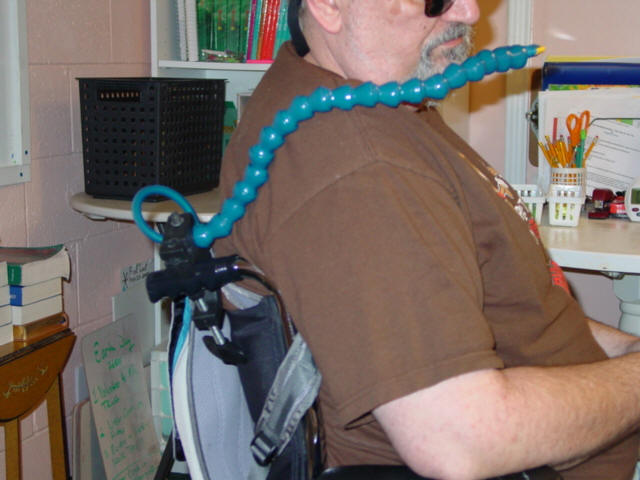  |
|||
| Hydration Backpack with Drink Tube Positioning | The Drink Aide | ||
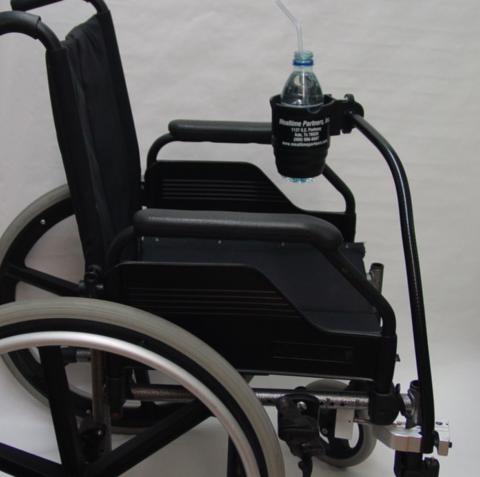 The Front Mounted Drinking System |
|||
Those who are at risk of choking should consider drinking from a Provale Cup: it provides a sip of thin liquid every time it is tipped up to take a drink. It prevents the user from receiving a large "gulp" of liquid. And, for those who are required to drink thickened liquids the Thicken Liquid Cup is an excellent choice. This cup can serve varying thicknesses of liquids and can control the volume of liquid that is served by an adjustable drinking spout that can serve a small stream of liquid or just a trickle. |
|||
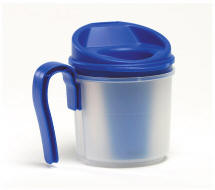 |
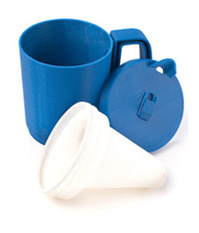 |
||
| The Provale Cup | Thickened Liquids Cup | ||
| To view all of the Mealtime Partners drinking products, click here. For additional guidance about how to select the appropriate drinking system for your specific needs, click here. | |||
Spout bottles are available in several different forms. They are available at most sporting goods stores for athletes, campers, etc. and are also sold in many chain stores and supermarkets. Additionally, water and sports drinks are sold in disposable spout-topped bottles.
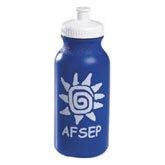 |
| Example of a Spout Bottle |
This bottle design is popular because it is a sealed container when the user is not drinking from it, and it is easy to access a drink without unscrewing a cap. You simply pull up the spout and take a drink. To seal the bottle you push the spout back down.
Many parents find these bottles a convenient way to give a child a drink. However, caution should be used when taking or providing a drink from this type of bottle because the spout is fixed vertically on the top of the bottle. When the spout is opened to take a drink, the bottle must be tipped upward to allow the fluid inside to run through the spout. The angle of the bottle prompts the person drinking to tilt their head backwards to take a drink. The tilting of the chin upward is likely to be amplified when someone is providing a drink to another person, whether it is a child or adult. Raising the chin to take a drink extends the windpipe to a position that makes it easier for food or liquid to enter it. When the head is extended upward, the epiglottis, that covers the larynx during swallowing, is placed under greater tension and does not make as good a seal over the larynx as when the head is in its normal upright position. When the head is tipped upward, particles of liquid or food may enter the larynx and cause choking. If the particles are inhaled farther than the beginning of the larynx, they may enter the lungs and will not be able to be removed by coughing. Foreign matter that enters the lungs can cause infection that may eventually result in pneumonia. Therefore, any method or position used for eating or drinking that increases the risk of inhaling any foreign material (liquid or solid) into the windpipe, should be avoided.
| Did You Know? Did you know that ice cube trays are an excellent way of freezing small portions of food? Simply fill the tray with the desired food and freeze. Once the food is frozen it can be popped out and put into snack sized plastic bags. One or two cubes of food can be quickly thawed to provide easy meals and snacks for individuals who need frequent small meals or require a special diet. The small sized portions are especially useful for children. |
November 2012 Newsletter References:
1. DeLegge, M. H., Aspiration pneumonia: Incidence, mortality, and at-risk populations. Journal of Parenteral and Enteral Nutrition, Nov/Dec, 2002.
2. Eisemann Shimizu, M., Otsuka, A., Kania, S., Oki, S., The Therapeutic Effects of Independent Eating for the Severely Physically Disabled. Journal of Phys. Ther. Sci. 16: 73-79, 2004.
Mealtime Partners Website Navigation:
Home |
Dining | Drinking | Videos | All Products | Ordering | Calendar | FAQ | Newsletters | Contact
Please send comments and suggestions to newsletters@mealtimepartners.com
Copyright © Mealtime Partners, Inc. 2012
All rights reserved.